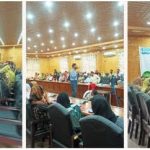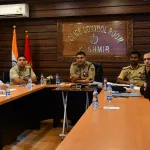Ganderbal, July 22: As part of the ongoing project titled “Inclusion of Indigenous Survival Skills in Livelihood Security of Tribal Community in Kashmir, India”, funded by the Department of Science and Technology (DST-SEED), Government of India, the Institute of Business and Policy Research (IBPR), SKUAST-Kashmir conducted a successful awareness-cum-training program on July 21, 2025, at Village Mamar, District Ganderbal.According to a statement issued here, the program was held in collaboration with the Department of Animal Husbandry. The initiative brought together key stakeholders including Dr. Omar Fayaz Khan (Principal Investigator of the Project), Dr. Ubair Nisar (Assistant Professor, IBPR), Dr. Mehreen (Veterinary Assistant Surgeon, Mamar), support staff of the veterinary unit, project staff, B.Sc. Economics and Data Science students, and members of the tribal and vulnerable communities.The primary objective of the program was to identify, document, and integrate traditional knowledge and indigenous survival skills into sustainable livelihood models for tribal communities. Speaking in the local vernacular, Dr. Omar Fayaz Khan (PI of Project) outlined the project goals, emphasizing the importance of community participation in the baseline survey. He encouraged tribal households to share their traditional practices, which would help design interventions for skill preservation, enterprise development, networking, and market linkages.Dr. Ubair Nisar, an expert in agricultural economics, underscored the importance of linking indigenous knowledge systems with modern livelihood strategies. Dr. Mehreen, (VAS) who is closely connected with the local community, played a crucial role in building rapport and encouraging wholehearted participation in the baseline data collection.
IBPR, SKUAST-K conducts training prog for tribal communities

Sign Up For Daily Newsletter
Be keep up! Get the latest breaking news delivered straight to your inbox.
By signing up, you agree to our Terms of Use and acknowledge the data practices in our Privacy Policy. You may unsubscribe at any time.
Leave a Comment Leave a Comment
Stay Connected
Latest News
Recent Posts
- Pulwama fruit traders decry delay in promised sheds and road at Prichoo wholesale market.
- Chenab river flows in spate, Akhnoor villages submerged; 40 trapped, rescue on
- IGP Kashmir chairs security review meet ahead of Eid Milad-un-Nabi
- NH-244 bridge washout spurs rapid Army response in J&K
- CB Kashmir registers FIRs in ₹53 lakh land fraud & fake contract promises







